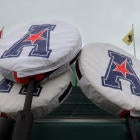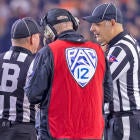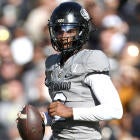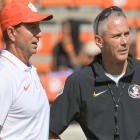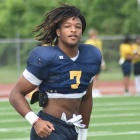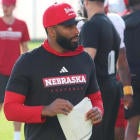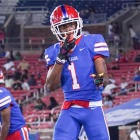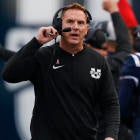There's something awkward about trying to find a dark horse team in the American Athletic Conference. Not because such teams don't exist, but because the conference itself seems like a dark horse.
Think about it. The AAC was created with the semi-recognizable remnants of the Big East, a former BCS conference. To become a more viable entity, the conference welcomed programs from smaller conferences and even convinced Navy to give up its entire history as an independent to become part of the group.
Now the AAC is fighting to be accepted as the sixth power conference. I don't know if it will ever be accepted as one (it's tough to convince a five-member cartel making a ton of money to suddenly split it six ways), but you can't rule it out.
It's an aspiration that makes the conference a dark horse of a different color.
While I can't look far enough into the future to determine whether the AAC will ever be successful, what I can do is try to figure out whether we'll see a dark horse team within the conference this season.
With both South Florida and Memphis picked to finish in first place in their divisions by the media, neither school was considered for this post (though both are included in a different list). Everyone else was in play, and these are the three teams I believe have the best chance.
Cincinnati
USF is the clear-cut favorite in the East as it received all 30 first-place votes. Then there are the Bearcats, who have a nice gap between them and the bottom of the division in the poll, but still find themselves far behind the Bulls in fourth place. It's a prediction that could look foolish given this team's potential.
The Bearcats took a significant step backward last season, finishing at 4-8. This seemed to be a theme to Tommy Tuberville's tenure in town, which is why he was replaced with Luke Fickell. I'm always a bit hesitant to expect a huge step forward in a coach's first season, but Fickell is at least inheriting a team that has plenty of experience.
Cincinnati will have plenty of seniors and juniors playing key roles this year, which is always a blessing to a new coach. Also, while the Bearcats didn't win enough games under Tuberville, compared to the rest of the conference, they recruited well. The only teams to have better classes than the Cats over the last five years in the AAC are UCF, USF and Memphis (if we just look at The Herman Years, Houston was ahead, too).
The schedule has some bonuses as well. While facing Navy on the road won't be much fun, the other two West teams the Cats draw are SMU and Tulane. That's a friendly draw overall, as Cincy will avoid both Houston and Memphis.
A primary concern for Cincinnati will be its offensive line. No offensive line in the AAC has fewer career starts than Cincinnati's unit.
Houston
Houston won a Peach Bowl against Florida State two seasons ago. Last year, the Cougars were picked by quite a few people to not only win the AAC but reach the College Football Playoff. These two facts are probably making it pretty difficult for you to consider the Cougars a dark horse, but I assure you that quite a bit has changed since then.
First of all, Tom Herman is gone. Texas came calling and now a former Texas quarterback, Major Applewhite, is in charge at Houston. Also, even if Houston had very high expectations heading into 2016, it only managed to go 5-3 in conference play.
So just because some thought it was a juggernaut doesn't make it one.
This year, the Cougars have been chosen to finish second in the West behind Memphis, which is precisely where I'd put them had I been asked to vote. But I'd also be wary of what this Houston team can do.
While there are some key losses to account for, Herman recruited well, and a lot of those recruits are juniors and seniors now. Furthermore, even with a new quarterback -- you may remember Kyle Allen from his days at Texas A&M -- the Cougars offense still has Duke Catalon at running back, and Catalon will be rushing behind one of the most experienced offensive lines in the AAC. Former five-star Ed Oliver still anchors the defense.
There is a lot of talent here, and that talent raises this team's potential.
Houston also has a slight advantage because the annual meeting with Memphis will be played in Houston this season, as will its showdown with Navy.
Houston failed to meet expectations last year. It could easily exceed them this year.
UCF
A lot will have to go right for the Knights, but if it does, this is a team that could surprise a lot of people. OK, maybe not that many, as they were picked to finish second in the division, but nobody gave them a first-place vote while doing so.
There's plenty of potential here. One reason for this is how quickly things turned around under Scott Frost last year. Frost inherited a team coming off a winless season and somehow got the Knights to a bowl game. While expecting another six-win improvement in 2017 is foolish, just half that number would make this team a real contender in the AAC.
Where things get sketchy is the overall experience of the roster. Working in UCF's favor is the fact it has one of the most veteran offensive line units in the conference (only Memphis' OL has more career starts). Working against the Knights is that the rest of the roster is inexperienced, as there are only six seniors projected to start this year.
The wild card will be the youth of this roster. Frost's first recruiting class at UCF finished fourth in the conference. His 2017 class was rated the best in the AAC.
While expecting sophomores and freshmen to be key contributors early typically leads to a lot of losses, if some of those new additions prove to be helpful, it could boost UCF's stock this season.







